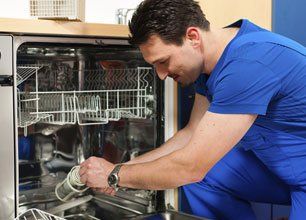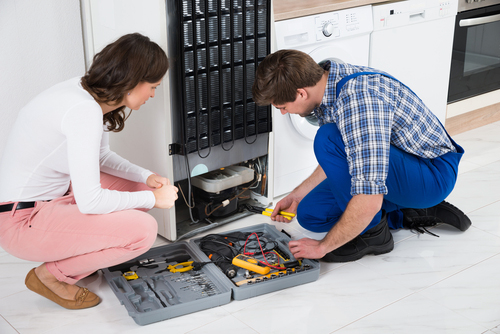Necessary Tips for Effective Ref Fixing to Extend Device Life Expectancy
When it involves your fridge, proper repair service and maintenance are crucial for long life. You could not realize exactly how tiny issues can escalate if they're left unaddressed. Regular examinations and basic fixes can save you from costly replacements down the line. Comprehending usual problems and knowing when to act can make all the difference. Let's explore some necessary tips that will help you keep your fridge running smoothly for many years to find.
Comprehending Typical Fridge Problems
Refrigerators are important in maintaining your food fresh, but they can encounter an array of common troubles that disrupt their efficiency. If you notice food ruining quicker than typical, examine the thermostat settings or think about if the door seals are damaged. Recognizing these issues early can save you time and cash in repairs, guaranteeing your fridge runs smoothly and efficiently.
Normal Maintenance Practices
To maintain your home appliances running efficiently, you need to remain on top of normal maintenance techniques. Clean the condenser coils, inspect the door seals, and check the temperature settings to guarantee peak performance. These basic jobs can conserve you money and time on repairs down the line.
Clean Condenser Coils Regularly
Cleansing your condenser coils on a regular basis can significantly enhance your appliance's efficiency. Dirt and dust develop up on these coils over time, triggering your appliance to function more challenging and take in even more power. To maintain them tidy, disconnect your home appliance and meticulously get rid of any type of protective covers.
Examine Door Seals
Three straightforward actions can help you guarantee your appliance's door seals are in good problem. 2nd, clean the seals utilizing warm, soapy water to remove any debris or crud. By adhering to these steps, you'll maintain your device's performance and durability, saving you cash on energy bills and repair work in the long run.
Screen Temperature Level Settings
Regularly monitoring your appliance's temperature setups is crucial for ideal performance and performance. Whether you're handling a refrigerator, fridge freezer, or oven, maintaining an eye on these settings can prevent several problems. For fridges, aim for temperatures between 35 ° F and 38 ° F; for fridges freezer, stick around 0 ° F. If the temperature levels are as well high or low, your device may function harder, losing power and shortening its life-span. Use a thermostat to inspect these settings routinely, specifically after major adjustments, like relocating your home appliance or readjusting the thermostat. If you discover variations, adjust the settings accordingly and get in touch with the user guidebook for guidance. By staying proactive regarding temperature surveillance, you'll ensure your devices run efficiently and last much longer.
Troubleshooting Cooling Issues
When your refrigerator isn't cooling down effectively, it can lead to spoiled food and squandered money, so resolving the problem promptly is crucial. Beginning by checking the temperature settings to validate they go to the suggested degrees, normally around 37 ° F for the refrigerator and 0 ° F for the fridge freezer. If the setups are appropriate, evaluate the door seals for any kind of voids or damages; a damaged seal can allow warm air to enter.
Next, analyze the vents inside the fridge and freezer. Verify they're not blocked by food items, as this can disrupt airflow. Pay attention for the compressor; if it's not running or making uncommon noises, it may need focus. Lastly, inspect the condenser coils, normally located at the back or bottom of the unit. Dirt and debris can collect, triggering cooling concerns. Tidy them with a vacuum cleaner or brush to maximize performance. If troubles linger, it might be time to call a specialist.
Taking Care Of Water Leakage and Ice Build-Up
If you're taking care of water leak or ice build-up in your appliance, it's essential to recognize the source of the issue. By identifying where the water is coming from, you can protect against additional problems and avoid pricey repair services. Let's explore some effective approaches to deal with these usual issues.
Identify Leak Sources
How can you successfully identify the resources of water leakage and ice build-up in your home appliances? Beginning by checking the seals and gaskets on your fridge and freezer doors. A used or broken seal can allow cozy air to go into, creating condensation and ice. Next, examine the drain pan and water drainage system for blockages or blockages; a backed-up drain can bring about water pooling. Try to find any loosened connections in the water line, which can develop leakages. Likewise, take a look at the defrost drainpipe for ice buildup, which might interrupt appropriate drainage. By systematically inspecting these locations, you'll determine the resource of the problem, enabling you to take the essential actions to repair it and expand your appliance's life expectancy.
Protect Against Ice Development
To prevent ice development in your appliances, begin by verifying the temperature settings are suitable. If your refrigerator or fridge freezer is as well cool, it can lead to too much ice accumulation. Check the door seals on a regular basis; harmed seals can let warm air in, triggering condensation and ice development.
Keep the home appliance well-ventilated and avoid overcrowding, as this can obstruct airflow - Best Appliance Repair Company In Oro Valley Dependable Refrigeration & Appliance. Also, consistently thaw your freezer if it doesn't have an automated defrost function.
If you notice water leak, identify and repair any type of obstructed drainage openings, as they can add to ice buildup. Finally, clean the coils and validate they're functioning properly to maintain peak efficiency. Taking these actions will certainly help prolong your appliance's life expectancy and effectiveness.
Attending To Noisy Fridge Sounds
While it could seem startling, a loud refrigerator usually signals small concerns rather than significant malfunctions. Identify the source of the sound. Usual offenders consist of the compressor, fans, and water lines. If you hear a humming audio, it might be the compressor striving; this can just be a typical procedure audio.
Following, look for loosened products inside. Sometimes, containers or shelves can rattle, producing undesirable noise. Tighten or rearrange them to get rid of the audios.
If you see a clicking sound, it might be the defrost timer. This is usually safe but might suggest it requires assessment.
Ultimately, validate your fridge is level. An unbalanced appliance can produce vibrations and noise. Make use of a degree to inspect, and readjust the feet if required. Dealing with these problems without delay can aid preserve your refrigerator's performance and extend its life expectancy.
When to Change Parts vs. Complete Replacement

However, if your device is older and experiencing several problems, a complete substitute can be more affordable. Consider the expense of fixings versus the appliance's value. If repair services go beyond 50% of a brand-new unit's cost, it's normally better to buy a replacement. Additionally, if you discover continuous troubles that keep recurring, it's a sign that your home appliance has actually gotten to completion of its life. Evaluate these aspects meticulously to make the best decision for your requirements and spending plan.
Knowing When to Call a Professional
How can you tell when it's time to call in an expert for device repair work? If your device stops working completely or often trips circuit breakers, it's one more red flag.
You ought to additionally consider your very own comfort degree click over here now with repair services. If you're not sure regarding window air conditioner repair near me identifying the problem or do not have the right tools, it's best to connect for help. Remember, trying complex repairs can bring about more damage or perhaps safety hazards.

Regularly Asked Questions
Exactly how Frequently Should I Tidy the Refrigerator Coils?
You must cleanse your refrigerator coils every 6 months. This assists keep effectiveness and stops overheating. If you notice too much dust or family pet hair, clean them much more regularly to over here assure your fridge runs smoothly.

Can I Use Vinegar for Cleaning My Refrigerator?
Yes, you can use vinegar to clean your fridge! It's an exceptional natural cleanser that eliminates odors and spots. GE appliance repair Oro Valley Dependable Refrigeration & Appliance Repair Service. Just blend it with water, use it to surfaces, and clean down for a fresh, tidy refrigerator
What Temperature level Should My Fridge Be Set To?
You ought to set your refrigerator to 37 ° F(3 ° C) for perfect food preservation. This temperature level keeps your food fresh while avoiding spoilage, ensuring your grocery stores last much longer and minimizing waste. It's a very easy adjustment you can make!
Does a Refrigerator Required to Be Leveled?
Yes, your fridge needs to be leveled. If it's uneven, it can affect cooling effectiveness and cause excess sound. Inspect the leveling legs and readjust them to guarantee proper equilibrium for excellent efficiency.
How Can I Reduce Fridge Energy Consumption?
To lower your fridge's energy intake, maintain it tidy and well-ventilated, inspect door seals for leaks, established the temperature in between 35-38 ° F, and avoid overloading it. These actions can substantially reduce your energy costs.